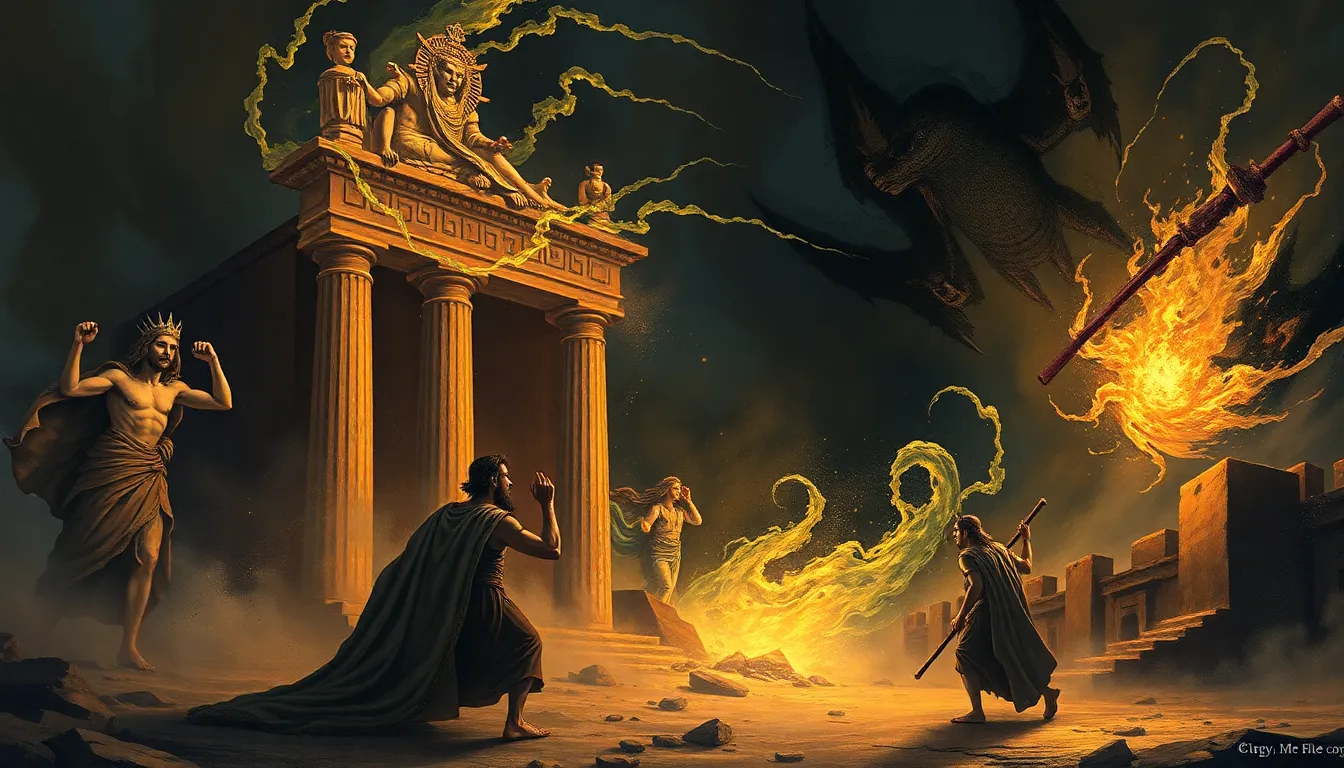Cursed by Fate: The Most Notable Divine Punishments in History
I. Introduction
Divine punishment is a concept that has pervaded human history, illustrating the consequences of human actions in relation to the divine. It embodies the idea that the gods—or a singular God—impose suffering or calamity on individuals or groups as a response to their transgressions, hubris, or moral failings. This notion is closely linked to the themes of fate and destiny, prevalent in many ancient belief systems, where individuals often find themselves at the mercy of forces beyond their control.
This article aims to explore notable instances of divine punishment across cultures and eras, analyzing their significance and the moral lessons they impart. By delving into these stories, we can gain insight into how ancient civilizations understood justice, morality, and the human condition.
II. The Concept of Divine Punishment in Various Cultures
Divine punishment manifests in various forms across different cultures, each with its own unique interpretation of justice and moral order.
A. Ancient Greek and Roman perspectives
In ancient Greek and Roman mythology, divine punishment was often depicted through tales of hubris and retribution. The gods were seen as powerful beings who would not tolerate disrespect or excessive pride from mortals. This belief was encapsulated in the Greek concept of Nemesis, the goddess of retribution, who ensured that balance was maintained through punishment.
B. Eastern philosophies and religions (Hinduism, Buddhism)
In Eastern philosophies, such as Hinduism and Buddhism, divine punishment is often perceived through the lens of karma. Actions in this life determine one’s fate in future incarnations, creating a cycle of cause and effect that governs moral behavior. This perspective emphasizes personal responsibility and the inevitability of consequences.
C. Abrahamic traditions (Judaism, Christianity, Islam)
In the Abrahamic traditions, divine punishment is frequently illustrated through sacred texts. The Old Testament recounts numerous instances of God’s wrath against sin, while the New Testament emphasizes themes of repentance and divine mercy. In Islam, divine punishment is seen as a mechanism of justice, where the Day of Judgment reveals the ultimate consequences of one’s earthly actions.
III. The Story of King Midas: The Curse of Excess
King Midas, a figure from Greek mythology, is best known for his ability to turn everything he touched into gold. This golden touch, a boon at first, quickly became a curse.
A. Background on King Midas and his golden touch
Midas was granted this wish by the god Dionysus, but he soon realized that his gift was more of a burden. Food, drink, and even his beloved daughter turned to gold at his touch.
B. The implications of his wish and its consequences
Midas’s insatiable greed led to his isolation and suffering. He learned the hard way that excess can lead to one’s downfall.
C. Moral lessons derived from Midas’s fate
- Greed can lead to self-destruction.
- True wealth comes from love and relationships, not material possessions.
- One should be careful what they wish for.
IV. The Fall of Phaethon: Hubris and Divine Retribution
Phaethon, the son of Helios, sought to prove his divine lineage by driving his father’s sun chariot across the sky.
A. Overview of Phaethon’s quest to drive the sun chariot
Despite his father’s warnings, Phaethon insisted on taking the reins, believing he could control the mighty steeds.
B. The catastrophic results of his ambition
His lack of skill led to chaos; the earth was scorched, and Zeus ultimately had to intervene, striking him down with a thunderbolt.
C. Analysis of the theme of hubris in mythology
Phaethon’s story serves as a cautionary tale about the dangers of overreaching ambition and the importance of recognizing one’s limitations.
V. The Tragedy of Medea: Betrayal and Divine Wrath
Medea, a powerful sorceress and the wife of Jason, embodies the themes of love, betrayal, and vengeance.
A. Medea’s story and her transformation into an agent of divine punishment
After Jason betrayed her for another woman, Medea’s anguish turned into wrath. She resorted to horrific acts to exact her revenge.
B. Examination of her actions and their consequences
Medea killed Jason’s new wife and her own children, illustrating the depths of her pain and fury.
C. Reflection on themes of love, betrayal, and justice
- Love can transform into hatred when betrayed.
- Divine punishment often arises from personal vendettas.
- The consequences of one’s actions can be devastating and far-reaching.
VI. The Punishment of Prometheus: The Price of Defiance
Prometheus, a titan in Greek mythology, is celebrated for his defiance in stealing fire from the gods to give to humanity.
A. The myth of Prometheus and his theft of fire
His act of rebellion was seen as a challenge to Zeus, who deemed it unacceptable for mortals to possess such a divine gift.
B. The eternal punishment inflicted by Zeus
As punishment, Prometheus was bound to a rock where an eagle would feast on his liver daily, only for it to regenerate overnight, creating an endless cycle of torment.
C. Insights into the concept of sacrifice and rebellion against the divine
Prometheus’s story speaks to the themes of sacrifice for the greater good and the consequences of defying authority, highlighting the complexity of freedom versus submission.
VII. The Biblical Plagues of Egypt: A Testament to Divine Retribution
The ten plagues of Egypt, as recounted in the Book of Exodus, serve as a powerful example of divine punishment.
A. Overview of the ten plagues as a form of punishment
- Water turned to blood
- Frogs
- Gnats
- Flies
- Pestilence on livestock
- Boils
- Hail
- Locusts
- Darkness
- Death of the firstborn
B. Analysis of the moral and theological implications
These plagues were not merely physical afflictions but also served to demonstrate God’s power and to compel Pharaoh to release the Israelites from bondage.
C. The impact of these events on Jewish identity and faith
The Exodus narrative and the plagues remain central to Jewish identity, symbolizing liberation and divine intervention.
VIII. The Fall of Lucifer: The Ultimate Act of Divine Punishment
The story of Lucifer’s rebellion is one of the most profound narratives of divine punishment.
A. The story of Lucifer’s rebellion and subsequent fall
Lucifer, once a favored angel, sought to overthrow God and was cast out of Heaven as a result of his pride.
B. Exploration of the themes of pride and redemption
This narrative illustrates the consequences of hubris and the peril of aspiring to divine status.
C. The lasting influence of this narrative on religious thought
Lucifer’s fall serves as a warning against pride and the quest for power, influencing theological discussions about free will and redemption.
IX. Contemporary Interpretations of Divine Punishment
In modern times, interpretations of divine punishment have evolved, yet the core themes remain relevant.
A. Modern perspectives on the concept of divine retribution
Many contemporary thinkers view divine punishment through the lens of personal responsibility rather than literal retribution from a deity.
B. The role of fate in modern literature and popular culture
Fate and destiny continue to be prominent themes in literature and media, often reflecting the struggles between individual agency and predetermined outcomes.
C. Discussion on the relevance of these ancient stories today
The age-old tales of divine punishment resonate with modern audiences, reminding us of the timeless nature of moral lessons and the consequences of human behavior.
X. Conclusion
The narratives of divine punishment throughout history serve as profound reflections of human nature, morality, and the quest for justice. They reveal the intricate relationship between fate




